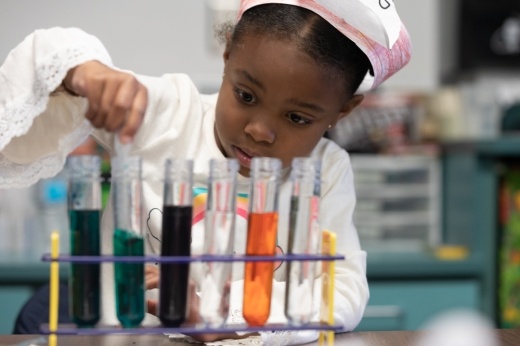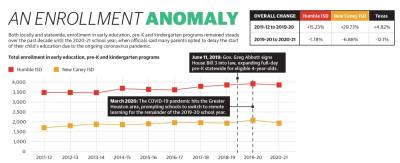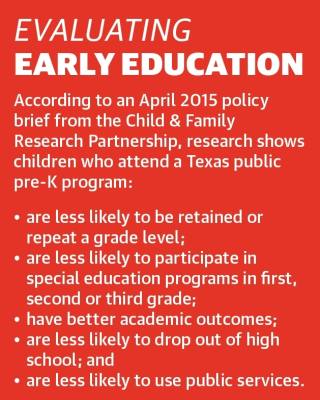Locally, Lake Houston-area school districts also experienced decreases in student enrollment in some of the earliest grade levels last school year, and officials said the trend is directly tied to the ongoing coronavirus pandemic.
“It’s reasonable to attribute enrollment declines last year to the pandemic, particularly in early education, pre-K and kindergarten, for which enrollment is optional,” said Scott Powers, executive director of public relations for New Caney ISD. “[However], the enrollment decline in these grades in NCISD was less sharp than was generally reported statewide by the Texas Education Agency.”
In the 2020-21 school year, student enrollment in early education programs, pre-K and kindergarten dropped by nearly 2% in HISD and by nearly 7% in NCISD. By comparison, enrollment in these programs increased by more than 15% and nearly 30% in HISD and NCISD, respectively, from 2011-12 to 2019-20.
“Across the state and nation, some parents chose to keep their children at home due to the pandemic,” HISD Chief Communications Officer Jamie Mount said.
However, experts such as Kristi Martin-Smith, the director of education and training for Children’s Lighthouse, said delaying a child’s education could further exacerbate learning loss inflicted by the pandemic. The Fort Worth-based early education company has a franchise in the Lake Houston area.
“Delaying the start of a young child’s education can only be a pro if the child ... can engage in exploring, develop creativity and a sense of inquiry, learn the skills needed to be part of a learning community and be around other children to learn positive social interactions,” she said. “This type of environment can be done at home, but it takes a fully engaged adult to scaffold learning.”
As the 2021-22 school year begins, district officials are hoping to see enrollment in early education programs return to pre-pandemic levels.
Pre-K perks
The long-term benefits of effective early childhood education programs have been well documented, local educators said.
According to an April 2015 policy brief from the Child & Family Research Partnership, children who attend a Texas public pre-K program have better academic outcomes and are less likely to be retained or repeat a grade level, participate in special education programs, drop out of high school or use public services.
In addition to heightened literacy skills, Martin-Smith said children who enter kindergarten with positive emotional and interpersonal skills within a group of children have a greater chance of succeeding in school.
“Young children that are allowed to develop higher-level thinking skills through preschool activities ... develop healthy executive functioning skills ... [such as] memory, flexible thinking and self-control, all of which are key to healthy, daily living and most of which are difficult to learn through remote learning,” Martin-Smith said.
Research also indicates early childhood education programs are important for economically disadvantaged students, who accounted for more than 40% of HISD students and more than 65% of NCISD students in 2020-21, according to the districts’ data.
Similar research is part of what prompted the Texas Legislature to pass HB 3 in 2019, mandating full-day pre-K programs for those who qualify.
“Full-day pre-K provides opportunities for working families to access quality pre-K for their children,” said Bob Popinski, director of policy for Raise Your Hand Texas, an Austin-based public education advocacy group. “Especially after COVID[-19], our early learners need the social and emotional support as well as the academic support our state’s early childhood programs can provide.”
HISD offers half-day pre-K at 17 elementary campuses and full day pre-K at two elementary campuses. Similarly, NCISD offered full-day pre-K at four campuses in 2020-21, and the district will add full-day pre-K to three more campuses this fall. Both districts plan to offer full-day pre-K at all elementary campuses by 2022-23.
Encouraging enrollment
Heading into the 2021-22 school year, local school district officials said they are optimistic pre-K and kindergarten enrollment will return to pre-pandemic levels without spiking.
In HISD, officials are projecting 4,050 early education, pre-K and kindergarten students for the 2021-22 school year, while NCISD officials are projecting 1,755.
To further bolster student enrollment, Powers said NCISD began reaching out to parents of pre-K- and kindergarten-eligible students last spring. Powers said the district has also been working to ensure that all pre-K classrooms meet the High-Quality Prekindergarten Standards outlined by the TEA by implementing classroom technology, maintaining a student-to-teacher ratio of 11-1 and providing teachers with professional development that directly relates to early childhood practices.
For HISD’s young learners, the district has invested in interactive technology; hands-on, engaging materials that promote creativity, collaboration, communication and play; age-appropriate classroom furniture; and online platforms for family engagement and virtual learning. The district will also be implementing its new curriculum, “Three Cheers for Pre-K!,” this fall.
“We are excited about the implementation and cannot wait to see the progress our students make this year,” said Hailey Haynes, director of early childhood education for HISD.







